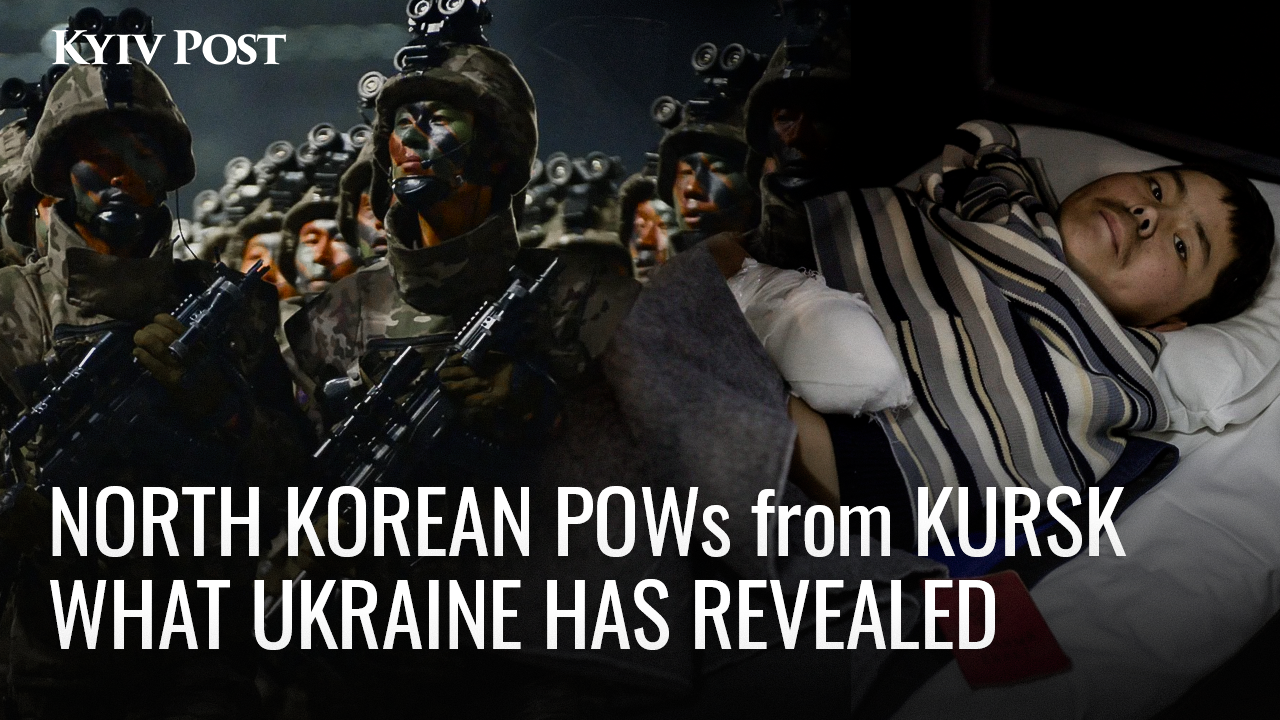Leadership in the Azov Brigade, a Ukrainian fighting unit almost completely wiped out in the early days of Russia’s invasion, on Wednesday announced the reconstituted formation has returned to combat and taken prisoners in a series of successful attacks.
JOIN US ON TELEGRAM
Follow our coverage of the war on the @Kyivpost_official.
A local defense unit originally raised from volunteers living in Ukraine’s southeastern Donetsk Region, the 12th National Guard Brigade, “Azov,” was surrounded and effectively destroyed during the Russian army’s siege of Mariupol from Feb. 28 to May 20, 2022.
Elements of the newly rebuilt Azov Regiment captured four Russian servicemen during recent assaults including a sub-commander in Russia’s 228th Motorized Rifle Regiment, video published by the Azov public affairs unit on Wednesday said. Two Azov Regiment members contacted by Kyiv Post independently confirmed the report.
Azov did not say where the operation took place but both they and Russia’s 228th Motorized Rifle Regiment have been fighting in Ukraine’s eastern Luhansk region. A Sept. 20 report from the Institute for the Study of War said the 228th Motorized Rifle Regiment was “operating near Kreminna” and headcam footage from the Azov brigade places them in the same area at the time.
Ukranian Azov forces storming Russian trenches and eliminating them. Kreminna area. #ukrainecounteroffensive pic.twitter.com/Dd1MjD09CW
— Yoddle (@iYoddl) September 1, 2023
A separate statement from the Azov Regiment said members of the Russian Storm-Z unit, generally considered a poorly trained formation made up, typically, of individual soldiers the Russian high command considers relatively expendable, also were hit by the Azov assault.

British Defence Intelligence Update Ukraine 23 January 2025
One man said he holds the rank of private rifleman in Russian army military unit 22316 (228th Regiment), and tells the questioner he has received good treatment from his captors.
He said he was a civilian reservist working as a tractor driver and forced to return to military service in October 2022, and claims he did not want to fight in Ukraine and that he “regrets” having been sent to the front line. The Azov attack came suddenly and left Russian troops under attack no alternative but surrender, he claims.
“We were just sitting in the trench when the shooting started. There was no way out, and then your (Ukrainian) troops arrived,” the soldier said.
A man identifying himself as a sub-unit commander within 228th Motorized Rifle Regiment, whose name was withheld said at the questioner’s prompting, “I’m sending greetings to my mom and dad. I'm fine,” and says Ukrainian troops treated him well and gave him proper medical treatment for wounds suffered in battle.
A third POW told captors he had been serving in the Russian Navy as a senior sailor and on Nov. 1 chose to volunteer for service in the army, signing a six-month contract. He said unemployment was a motivator for Russian citizens to volunteer to serve in forces invading Ukraine. The Russian government pays him 150,000 to 180,000 rubles ($1,543-$1,852) a month for wartime service in Ukraine, he said.
Originally raised as a unit with volunteers drawn initially from Ukrainian football (soccer) fans and pro-Ukraine political groups in 2014, during Russia’s first invasion of Ukraine, the Azov Brigade established itself as a unit with a reputation for fighting hard and die-hard commitment to Ukrainian independence from Moscow’s rule.
Azov and its message of Ukrainian national identity and total removal of Kremlin influence in Ukraine has made the formation a lightning rod for virulent Russian propaganda, which routinely describes Azov and its members as wholly recruited from Nazis, fascists and war criminals all dedicated to murdering Russian civilians.
Independent media in Ukraine and East Europe, among them Kyiv Post, have rubbished Moscow claims that Azov is a pack of Nazis, mostly describing the formation as one of the Armed Forces of Ukraine’s (AFU) more motivated fighting units. The Kremlin narrative has nonetheless persisted in mainstream media in some Western countries, and in China and the Middle East.
According to Ukrainian officials and accounts of Azov Regiment family members, around 2,000 Azov fighters remain in custody in Russian prisons in grim conditions, without access to sufficient nourishment or modern medical care.
Russian authorities have claimed many of the Azov detainees are guilty of war crimes and subject to prosecution under Russian law. On Sept. 27 a court in Rostov-on-Don opened proceedings against 24 Azov POWs on charges of “sedition” and participation in a terrorist organization, The New Voice of Ukraine Tweeted. Ukrainian and international observers have called it a kangaroo court in the tradition of Soviet purges.
In the video, four Russian soldiers are interviewed by a man with a digitally altered voice asking questions about how they were taken prisoner and their treatment once in Ukrainian army custody.
A man identifying himself as Konstantin Mykolayovych Vladimirov states he was born on Sept. 25, 1977, holds the rank of private rifleman in Russian army military unit 22316 (228th Regiment), and tells the questioner he has received good treatment from his captors.
A man identifying himself as a sub-unit commander within 228th Motorized Rifle Regiment, whose name was withheld said at the questioner’s prompting, “I’m sending greetings to my mom and dad. I'm fine,” and says Ukrainian troops treated him well and gave him proper medical treatment for wounds suffered in battle.
The Russian commander states he was a civilian reservist working as a tractor driver and forced to return to military service in October 2022, and claims he did not want to fight in Ukraine and that he “regrets” having been sent to the front line. The Azov attack came suddenly and left Russian troops under attack no alternative but surrender, he claims.
“We were just sitting in the trench when the shooting started. There was no way out, and then your (Ukrainian) troops arrived,” the soldier said.
A third POW identifying himself as Aleksandr Vladimirovich Stanin, 30, told captors he had been serving in the Russian Navy as a senior sailor and on Nov. 1 chose to volunteer for service in the army, signing a six-month contract. He said unemployment was a motivator for Russian citizens to volunteer to serve in forces invading Ukraine. The Russian government pays him 150,000 to 180,000 rubles ($1,543-$1,852) a month for wartime service in Ukraine, he said.
Originally raised as a unit with volunteers drawn initially from Ukrainian football (soccer) fans and pro-Ukraine political groups in 2014, during Russia’s first invasion of Ukraine, the Azov Brigade established itself as a unit with a reputation for fighting hard and die-hard commitment to Ukrainian independence from Moscow’s rule.
Azov and its message of Ukrainian national identity and total removal of Kremlin influence in Ukraine has made the formation a lightning rod for virulent Russian propaganda, which routinely describes Azov and its members as wholly recruited from Nazis, fascists and war criminals all dedicated to murdering Russian civilians.
Independent media in Ukraine and East Europe, among them Kyiv Post, have rubbished Moscow claims that Azov is a pack of Nazis, mostly describing the formation as one of the Armed Forces of Ukraine’s (AFU) more motivated fighting units. The Kremlin narrative has nonetheless persisted in mainstream media in some Western countries, and in China and the Middle East.
According to Ukrainian officials and accounts of Azov Regiment family members, around 2,000 Azov fighters remain in custody in Russian prisons in grim conditions, without access to sufficient nourishment or modern medical care.
Russian authorities have claimed many of the Azov detainees are guilty of war crimes and subject to prosecution under Russian law. On Sept. 27 a court in Rostov-on-Don opened proceedings against 24 Azov POWs on charges of “sedition” and participation in a terrorist organization, The New Voice of Ukraine Tweeted. Ukrainian and international observers have called it a kangaroo court in the tradition of Soviet purges.
В Ростові-на-Дону розпочато нове судилище над Героями Маріуполя з полку “Азов”. 24 Героїв будуть засуджувати до довічного ув’язнення pic.twitter.com/UNOVMQfUKX
— NV (@tweetsNV) September 27, 2023
On July 29, 2022, explosions hit a Russian prison facility in the Donetsk town of Olenivka, killing at least 40 Azov POWs and injuring at least 130.
Russian authorities at the time claimed Ukrainian artillery hit the facility to prevent Azov members from making public information about unspecified Ukrainian war crimes.
Ukrainian authorities and Azov representatives said the blasts took place after Russian warders cleared barracks and concentrated selected Azov prisoners tightly in a single building, that the detonations went off inside the building, and that no artillery hit anywhere.
A soldier present in the prison at the time of the attack in a recent Kyiv Post interview corroborated the Ukrainian version of events.
You can also highlight the text and press Ctrl + Enter













